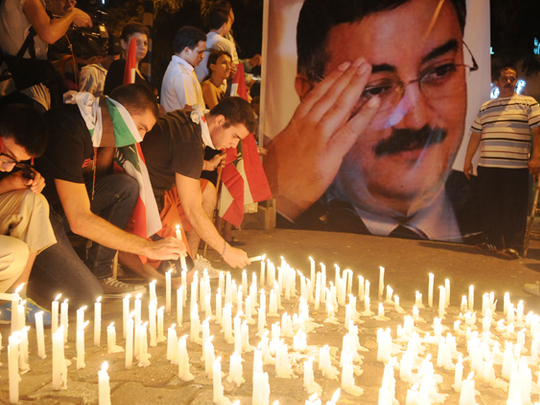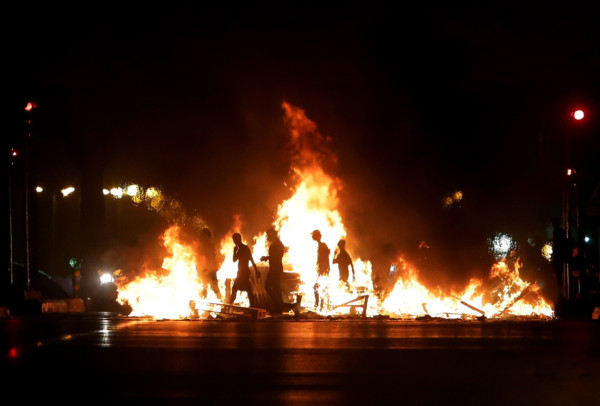
Beirut: Damascus has emerged the prime suspect in the assassination of Lebanon’s police intelligence chief but his death is unlikely to plunge the country into chaos, analysts said on Saturday, even as protesters burned tyres and set up roadblocks around Lebanon in a sign of boiling anger.
On Sunday, Lebanese security forces were setting up road blocks and cordoning off Beirut's central Martyrs' Square ahead of a public funeral for Brigadier General Wissam Al Hassan, who was killed in a powerful car bombing.
Giant posters of Al Hassan were set up around Beirut ahead of Sunday's funeral calling him a "martyr of sovereignty and independence."
A day after the car bombing that killed Al Hassan, Prime Minister Najeeb Mikati said he had offered to resign, but had been told by the president to remain in post to avoid a political vacuum.
The bombing, which also injured more than 80 people and caused large-scale destruction, revived memories of Lebanon’s 1975-1990 civil war and was the clearest sign so far that the conflict in Syria was engulfing its smaller neighbour.
Opposition leaders feared that the deadly blast in Beirut could mark the start of a new wave of assassinations targeting anti-Syrian politicians and security officials in Lebanon.
Most of the capital’s major roads looked deserted, as Lebanese army troops maneouvred protesters from one street to another.
Protests were mainly in Beirut, the southern city of Sidon and the northern city of Tripoli. Black smoke covered much of the capital, where garbage cans and rubber tyres were set on fire by the protesters.
Lebanon had declared yesterday a day of mourning for the eight people killed in the blast in Beirut’s mainly Christian neighbourhood of Ashrafiyeh. According to initial investigation, the bomb that killed Al Hassan weighed 60 to 70kg.
General Ashraf Rifi, Director-General of the Internal Security Forces, was cited as saying that Al Hassan’s remains were identified by his revolver and his watch. He would be buried in Beirut alongside the grave of his mentor, former prime minister Rafik Hariri, a security official said.
The opposition March 14 bloc had called on the Hezbollah-led coalition government to resign after the attack and called on their loyalists to participate in Al Hassan’s funeral today in what they called a “Day of Rage.”
In contrast, Grand Mufti Shaikh Mohammad Rashid Qabbani, Lebanon’s top Sunni cleric, called for calm. “We call on all Lebanese to exert patience and self-restraint and I tell you that the blood of the martyr Wissam Al Hassan and all the others will not go in vain and the perpetrators will be punished – sooner or later,” he said.
Analysts said the murder of Al Hassan appeared to show that even in its weakened state Lebanon’s neighbour and former occupier Syria could still take action on the ground.
“Hassan was targeted daily by pro-Syrian newspapers in Lebanon and Damascus accused him of aiding rebels hostile to [President] Bashar Al Assad,” said Gassan Al Azzi, a politics professor at Beirut’s Lebanese University.
The meticulousness with which Hassan’s assassination was planned and carried out has led to suspicions that his killers were professionals belonging to a state security apparatus.
“It’s a war between the [Lebanese and Syrian] security services,” said Fadia Kiwane, director of political science at St Joseph University in Beirut. “The various Lebanese protagonists are acutely aware of the gravity of the situation and will find a political solution to the assassination since no one wants a new civil war,” she said.
“The Lebanese people will not be silent on this heinous crime, and I vow not to remain silent,” Rafik Hariri’s son Sa’ad Hariri said a statement. Opposition March 14 member Amin Gemayel said: “The Syrian regime is no stranger to such explosions. This is a political blast par excellence.”
Walid Jumblatt, a leader of the Druze religious community, said: “Lebanon is left unsafe.”













